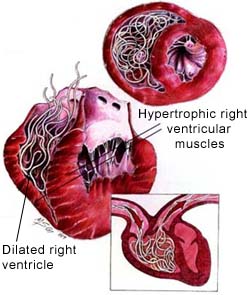Is your dog infected with heartworms? There are several causes of heartworms such as mosquitoes. The heartworm treatment for dogs depends on various factors such as
 Number of heartworms
Number of heartworms- Location
- Any existing medical problems such as kidney disease, liver disease or congestive heart failure
- The age and condition of the dog
- The existence of circulating microfilariae
Dogs infected with heartworm and have no symptoms or mild symptoms can show a great success rate when treated. Even dogs with more severe infection can be treated effectively but the likelihood of complications and death rate is greater. Following a thorough medical examination, your veterinarian discusses various options for heartworm treatment for dogs and suggests a treatment program depending on the evaluation. Here are different options of heartworm treatment for dogs:
Arsenic drugs:
The most popular heart warm treatment for dogs is injecting your pet with arsenic based drug. Nowadays it is the only proven method to kill the parasites blocked in the canine’s heart. The most common cause of heartworm is Dirofilaria, a parasitic roundworm. Heartworms are most common in areas with tropical or humid climate.
Immiticide drugs:
It is also the most common heartworm treatment for dogs. The drug is injected in two areas in the hip region. The injected area will swell and cause slight discomfort to the dog. Your dog may feel lethargic for few initial days and also feel trouble walking. Avoid touching the injected area because it is very painful to the dog.
Immiticide drug can kill adult heartworms that reside in your dog’s heart. After the initial injection, your dog may feel stressful for 4-6 weeks. So, prevent your pet from running, playing or getting excited. A process called phagocytosis can destroy the heartworms and after they expelled from the heart as small pieces. If the pet becomes excited a lot, heart will pump faster and harder. Expelling the heartworms too rapidly may lead the dead ones to travel into the lungs, which can cause respiratory problem.
Immiticide method has much lower risk of complications and it doesn’t cause any damage to dog’s kidneys and liver. The method can kill higher percentage of worms, so less treatment sessions are required.
Heartgard method:
It is a slow kill method, in which your dog is given a heartgard on a monthly basis. This medication fights against adult heartworms and slowly destroys them over a period of one to two years. Usually, adult worms live up to five years without any treatment. The sooner the treatment is started after infection, the more rapidly it will perform to destroy the adult worms.
But, most vets suggest using the fast kill approach to destroy heartworms. If the dog has very mild infection, slow kill method may be used.
Surgery:
In advanced cases, surgery is the most recommended heartworm treatment for dogs. Though this option is not preferred, killing the large mass of heartworms can only be possible with surgery.




